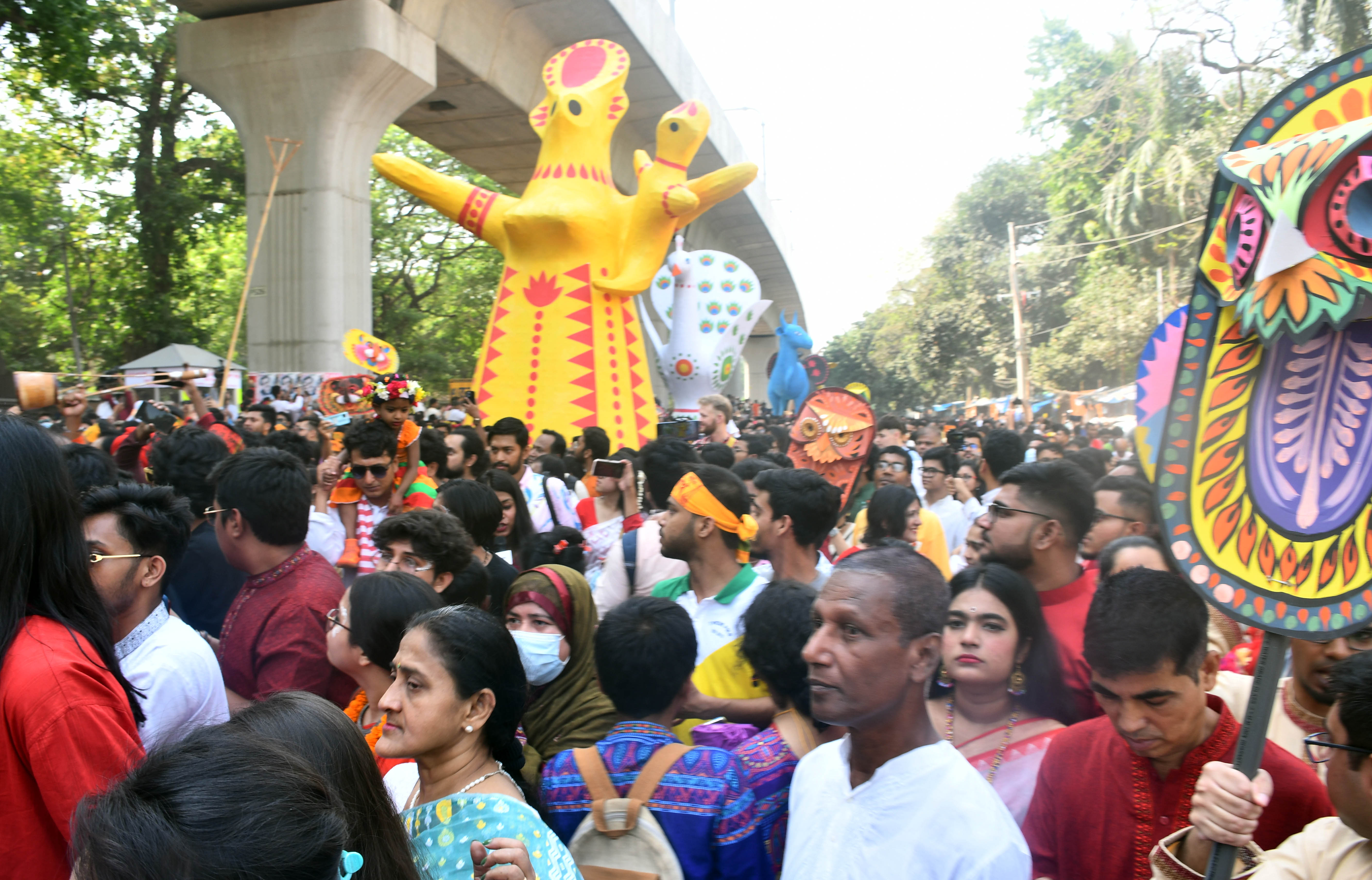
DHAKA, April 14, 2023 (BSS) - Pahela Baishakh, the first day of Bengali New Year-1430, was celebrated across the country today with festivity, upholding the rich cultural values and rituals of the Bangalees.
This year, celebration of the first day of the Bangla calendar began at the traditional venue Ramna Botmool in the capital along with bringing out the traditional 'Mangal Shovajatra' (procession) organised by the Fine Arts Faculty of Dhaka University.
DU Vice-chancellor Prof Dr Md Akhtaruzzaman inaugurated the Mangal Shovajatra while State Minister for Cultural Affairs K M Khalid, DU Pro-Vice Chancellor (Administration) Prof Dr Muhammad Samad and its Pro-Vice Chancellor (Academic) Prof Dr ASM Maksud Kamal were, among others, present.
Pahela Baishakh is one of the most colourful festivals through which the Bangalees bid farewell to the old year and welcome the New Year.
On this occasion, people from all walks of life wear traditional Bengali dresses. Young women wear white sarees with red borders and adorn themselves with bangles, flowers, and tips, while men wear white pyjamas and panjabi or kurta.
The government took an elaborate programme. The Mangal Shovajatra was brought out at divisional, district and upazila levels.
All secondary schools and colleges of the country celebrated Pahela Baishakh.
Bangladesh Awami League (AL), one of the country's oldest political parties, took programmes to celebrate the Pahela Baishakh, while Dhaka South City unit of AL brought out a colorful procession in the city.
The procession started from Bahadur Shah Park in the capital today at 7 am where AL central leaders, including the party's General Secretary and Road Transport and Bridges Minister Obaidul Quader, were present.
The procession ended at AL's central office on Bangabandhu Avenue here after parading different city streets.
Besides, a discussion was held in front of Bahadur Shah Park in Old Dhaka at 7 am.
Dhaka South City AL Acting President Nurul Amin Ruhul, MP, presided over the discussion while Dhaka South City unit of AL General Secretary Humayun Kabir conducted it.
Different government and non-government organisations, socio-cultural platforms, including Bangladesh Shilpakala Academy, Bangladesh Shishu Academy, Bangla Academy, Department of Public Libraries, the National Museum, Kabi Nazrul Institute, Copyright Office, National Book Centre, Bangladesh Small and Cottage Industries Corporation (BSCIC), the Department of Archives and Library and Dhaka University held various programmes along with seminars, exhibitions and quiz, essay and art compositions on the occasion.
As part of the Bengali New Year celebrations, Baishakhi rallies were organised in all districts, upazilas and unions of the country.
Besides, local administration organized quiz competitions, cultural programmes and folk fairs.
The programmes of the day usually began in the city with the musical soiree of Chhayanat, a leading cultural organisation of the country, at Ramna Batamul at dawn.
Bangladesh Television, Bangladesh Betar and private television channels broadcast live the programmes.
The city people usually started the day with the traditional breakfast of 'panta bhat' (soaked rice), green chili, onion and fried fish at Ramna Park, Suhrawardy Uddyan, Dhaka University Campus, Rabindra Sarobor at Dhanmondi and other amusement places. But, on the month of Ramadan, this traditional way of celebrating Pahela Baishahk was not widely followed.
Graffiti were painted in the walls signifying the arts, culture and heritage of the country.
On the occasion, all museum and archaeological sites remained open for all while children, students, people with disabilities and autism will be allowed to visit the museum free of cost.
Improved traditional food items were distributed to jail inmates, patients in hospitals and orphanages on the occasion.
Bangladesh missions abroad also organised different programmes to welcome the New Year.
The day is a public holiday.
Different national dailies published colourful supplements while Bangladesh Television, Bangladesh Betar and other private TV and radio channels aired special programmes highlighting the significance of Pahela Baishakh.
Some historians attributed the Bengali calendar to the 7th century king Shashanka, which was later modified by Mughal emperor Akbar for the purpose of tax collection.
During the Mughal rule, land taxes were collected from Bengali people according to the Islamic Hijri calendar. This calendar was a lunar calendar, and its new year did not coincide with the solar agricultural cycles.
Akbar asked the royal astronomer Fathullah Shirazi to create a new calendar by combining the lunar Islamic calendar and solar Hindu calendar already in use, and this was known as Fasholi shan (harvest calendar).